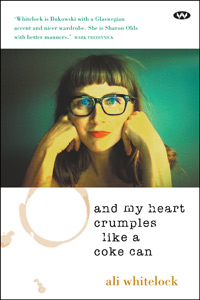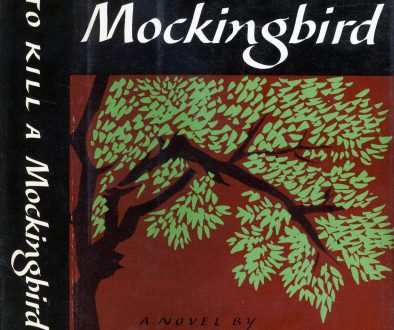Ali Whitelock’s poetry collection–and my heart crumples like a coke can
and my heart crumples like a coke can
Ali Whitelock
Wakefield Press, 2018
86 pgs.
and my heart
crumples
like a
coke can
by Ali Whitelock
Like Andy Warhol who painted popular consumer items such as boxes of Brillo and cans of Campbell’s soup, Ali Whitelock seeds her poems with trademarks—coke, coles, mars bars, and “to-ble-fucking-rones….” Unlike Warhol who zoomed in on them, elevating them to high art, Whitelock embeds consumer products by not beginning their trademarks with capital letters, embedding them the way advertisers have into our consciousness.
Actually, none of Whitelock’s poems are punctuated. Although she rants against the burden of aging, her poems, missing the punctuation, make you think of a breathless little girl running in to tell you the news of her day. And what news it is! She’s a social satirist who holds up our world and makes us burst into laughter. For example, in the first poem of her collection—a friend of mine with low self-esteem—she observes in a highbrow bookstore that “the staff/ in the bookstore do not say hello to you / or be nice to you because they are very / intellectual only they can’t find a job doing / an intellectual thing….” In “ode to an ovary,” a title funny in itself, you see her sharp wit when she writes about women whose husbands work in finance so they can “drive around in Mercedes / your alabaster breasts are full of low-fat milk…” She brings the same piercing wit to observations about herself. Railing against the cult of positive thinking and the New Age shtick “mani-fucking-festation,” she writes “may I complain proudly and loudly of aging…” and boy, does she ever! Although she tells us of failing eyesight, drooping breasts, there is no violin playing a song of self-pity. It’s a declaration of war! “…just let me eat cake and go quietly to seed.”
Her poems are so full of heart. Her ten-year-old dog pads through them, requiring more and more care, which she lavishes upon him. When he dies, you not only feel the grief of the poet for her dog, but you bear your own grief for him as if you too have fed him Omega oils, going to cafes with him, and sat beside him at the beach, staring out beyond the breakers. Her poems are like small stories with arcs, turns, “aha” moments, stories whose endings I don’t want to give away.
Born in a country childhood in Scotland, self-exiled to a burb of Australia, Whitelock is keen to the problems of immigrants and the frustration that too many Australian suburbanites who live in “a kuntry where sun is never stopping shining” don’t seem to be curious about the wider world. Some of the tenderest poems come about through meeting immigrants such as a clerk in a hardware store who had to leave Yugoslavia.
Whitelock’s poems are about love, the ache for it, the throwing away of it, leaving one’s homeland, the death of loved ones, of hope. And yet her writing is so hopeful, creating order out of chaos, working her way to a teetering balance despite every “triggering tremor.” Her writing allows you to get to know her, and, in many ways, ultimately yourself.

